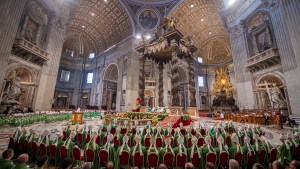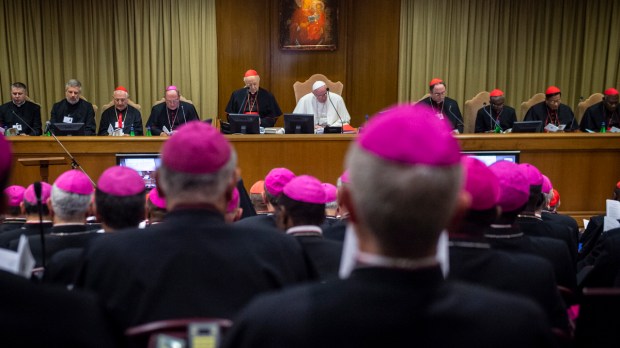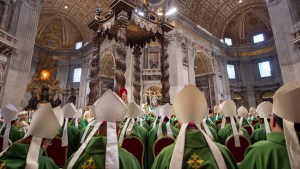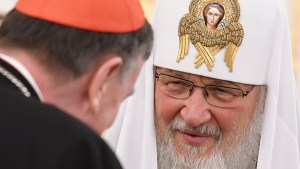On October 10, 2021, Pope Francis will solemnly inaugurate the Synod on Synodality. All the dioceses of the world are called to participate in this two-year process.
Here is a look at the major issues of this unique synod that is part of Francis’ great program for the Church.
How is the Synod on Synodality new in its form?
It’s a “third way” that Pope Francis has just opened in the realm of synodality. Revived by the Second Vatican Council, synods—assemblies gathered to reflect on a particular theme—are usually held either at the local level of the diocese or at the universal level, with bishop delegates from around the world meeting in Rome.
In launching the Synod on Synodality, Pope Francis is innovating by proposing three phases of reflection: local, continental, and then Roman.
The local phase is to last six months and mobilize all dioceses and parishes (until March 2022), and will result in a 10-page synthesis in each diocese. These will then be sent to the national episcopal conferences for a comprehensive synthesis. These documents will then be sent to Rome to serve as a basis, from September 2022, for new discussions at the continental level. These will lead to the elaboration of new syntheses that will then serve as a foundation for the final synodal phase in Rome in October 2023.
This vast process was welcomed by most of the bishops consulted by I.MEDIA. However, according to them, it comes on top of a tight schedule in 2021, already occupied by two celebrations declared by Rome: the Year of St. Joseph (which concludes in December) and the Year of Amoris Laetitia. Archbishop François Kalist of Clermont-Ferrand, for example, regretted a “disparity between ambition and means.”
Is the Synod on Synodality the culmination of Pope Francis’ reform?
“It is precisely this path of synodality which God expects of the Church of the third millennium.” These words were spoken by Pope Francis in 2015 in Rome on the occasion of the 50th anniversary of the institution of the Synod of Bishops. What are the enemies of this aggiornamento called for by the pontiff? The spirit of “clericalism,” an evil he never ceases to denounce, which consists in exaggerating the spiritual power of priests, as well as that of the founder or leader of any entity in the Church.
But Pope Francis is also against “rigidity,” which rejects all change on principle, while according to him the Church is organic and therefore constitutionally called to be in movement—recognizing in this the definition of the word “synod,” “walking together.”
“He was elected for this,” Bishop Joseph Ha, auxiliary bishop of Hong Kong, recently told I.Media. The Chinese prelate recalled that the Argentine Pontiff had inaugurated his pontificate by creating a council of cardinals to advise him, thus sending a “strong message.”
The pope, who has never hidden his concern with things that are closed in on themselves, has often sought, through his appointments, his declarations, and his style of governance, to give attention to what he calls the “peripheries.”
He has already called for three synods since his election in 2013—on the Family, Youth, and then on Amazonia. At the end of the last one, however, he lamented the polemics that sought to turn the synodal topic into a political fight.
As he said in his Christmas address to the Curia in 2020, the Church is “a body in continual crisis, precisely because she is alive. She must never become a body in conflict, with winners and losers.”
The only thing that makes the difference between the two situations, he said, is “the presence of the Holy Spirit.” And Cardinal Mario Grech, secretary of the Synod of Bishops, repeated the essence of these words: if this synod does not learn to discern better, that is, to listen to the will of God individually and collectively, “it will be a failure.”
Could the synod damage the unity of the Church?
It is “always a challenge to go into the spiritual depths,” Bishop Heinrich Timmerevers of Dresden-Meißen recently told I.Media. The German prelate speaks from experience: while he is convinced that the synodal dimension of the Church is “crucial” today, he also knows that in his country, the national synod launched in 2019 has not been a peaceful or easy road.
His Swiss colleague Bishop Jean-Marie Lovey, of the diocese of Sion, understands this fear. However, he considers it to be mainly based on presuppositions that short-circuit the process itself. The synod is not a political parliament, he insists, but a way of “walking together,” referring to the etymology of the term. It is in this way, he assures us, that the synod will not cause division but on the contrary “bring greater communion” to a community that struggles to think of itself as united.
In this, the two bishops agree with Pope Francis, who in his book Let us dream: The Path to a Better Future (2020) distinguished the fruitful opposition of “contraposition” from the sterile binarity of “polarization.”
In other words, for the pope, the synod must not deny the disagreements, charisms, and sensitivities within the Church, but rather explore them as differences in order to seek greater cohesion.
He also says he sees the synodal process as a way to “unmask agendas and hidden ideologies.” Rather than fearing them, he said ideological pressures are “a good sign.” For wherever the Spirit of God is present, “so, too, are temptations to silence it or distract from it.” He adds, “If the Spirit weren’t present, those forces wouldn’t bother.”
While the synodal dynamic seeks to strengthen unity within the Church, it is also hoped that it will strengthen the ties between the Catholic Church and other Christian confessions.

Does the synod hope to respond to the crisis of abuse in the Church?
“Words cannot be enough; we are all called to commit ourselves resolutely to the fight against abuse, as the preparatory document for the synod invites us to do.” This appeal of the undersecretary of the Synod of Bishops, Sister Nathalie Becquart, posted on her Twitter account on October 5, the day of the publication of the CIASE report on sexual abuse in the Church in France, is a reliable sign. The sexual abuse crisis, because it stems from a misguided notion of the exercise of authority in the Church, will be at the heart of the synodal reflections—at least in the dioceses where the cases have come to light.
Four days before the publication of the CIASE report, Bishop Eric de Moulins Beaufort, president of the French Bishops’ Conference, then in Rome, revealed that there were no plans to launch a national synodal process in France to address the issue of abuse—as was the case for the Church in Germany or Ireland. However, he suggested that the synod that will open on October 16 in all the dioceses of the world will be the occasion to “gather what will come” on these questions.



